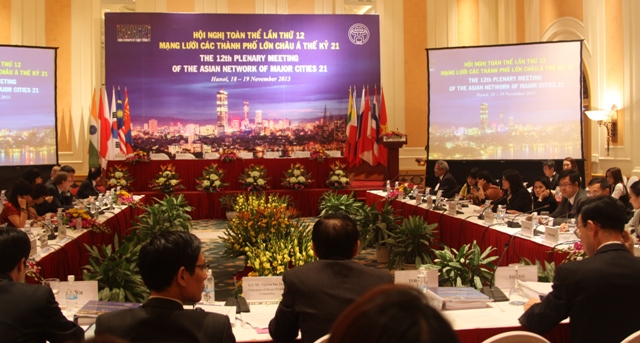MOUs bode well for capital FDI

The seven MoUs were a result of the Asian conference on investment, trade and tourism promotion, organized for the first time within the framework of the 12th plenary meeting of the network of major cities, also known as ANMC21.
The involved parties included the Hanoi Department of Planning and Investment (DPI) and local companies DDK Construction, MTV Thang Long, Red Tours, and THT Development, as well as Malaysian MATRADE, India’s Hannel, Japan’s Forval Group, South Korea’s Cherry Tour Company, Singapore’s Golden M Holidays, Russia’s WaterHunter Group, and South Korea’s Development Bank.
Nguyen Van Suu, Deputy Chairman of Hanoi People’s Committee said the conference was an opportunity for local and foreign businesses and organisations to exchange information on the investment, trade and tourism markets and to seek investment opportunities.
Ngo Van Quy, director of DPI said human resources in Hanoi and surrounding areas were young and easily recruitable. More than 50 universities and colleges in Hanoi turn out 80,000 workers every year.
According to figures from the DPI, Hanoi has consistently been among the top five cities in the country in terms of luring FDI. By the end of October there were 2,621 FDI projects throughout the city with total investments of $20.7 billion.
Among the 41 nations and territories invested in Hanoi, Korea is in the lead in terms of registered projects with 800 valued at $3.84 billion while Japan tops the list in terms of registered capital with $4.48 billion in 480 projects. Other ANMC21 countries that are top investors include Singapore with $3.35 billion, Malaysia with $1.74 billion, and Thailand with $0.21 billion.
In terms of tourism, Hanoi attracts about one-third of the total number of international visitors annually. In the first 10 months of this year it welcomed 2.1 million people, up 23 per cent on-year.
According to Terada Koji, managing director of Forval Corporation, a provider of IT services in Japan, most Japanese enterprises at present use components and parts purchased from their parent companies or other overseas group subsidiaries. Their work in Vietnam is primarily processing, setting, and repairing. As a result, R&D is greatly lacking.
Terada Koji added that the main problems Japanese enterprises are facing in Vietnam are insufficient technically proficient human resources and complicated policies and procedures.
The city has said it plans to attract investment in supporting industries, but as of yet there are no specific incentive policies. “These are the main obstacles in the way of more Japanese investment, and investment from other countries as well,” he added.
Toward improving tourism development among ANMC21 member countries, deputy director of Hanoi Tourist Nguyen Minh Chung proposed members further reduce barriers to entry and exit. He used the example of visa exemptions boosting regional tourism.
Chung added that transport is another factor deeply affecting the tourism industry. He said member nations should consider added investment into the sector, noting setting up new air routes such as Hanoi-Delhi or developing a land route between Hanoi, Bangkok, Kuala Lumpur, and Singapore.
Established in 2001, ANMC21 thus far has 13 participating members.
What the stars mean:
★ Poor ★ ★ Promising ★★★ Good ★★★★ Very good ★★★★★ Exceptional
Latest News
More News
- Hermes joins Long Thanh cargo terminal development (February 04, 2026 | 15:59)
- SCG enhances production and distribution in Vietnam (February 04, 2026 | 08:00)
- UNIVACCO strengthens Asia expansion with Vietnam facility (February 03, 2026 | 08:00)
- Cai Mep Ha Port project wins approval with $1.95bn investment (February 02, 2026 | 16:17)
- Repositioning Vietnam in Asia’s manufacturing race (February 02, 2026 | 16:00)
- Manufacturing growth remains solid in early 2026 (February 02, 2026 | 15:28)
- Navigating venture capital trends across the continent (February 02, 2026 | 14:00)
- Motivations to achieve high growth (February 02, 2026 | 11:00)
- Capacity and regulations among British areas of expertise in IFCs (February 02, 2026 | 09:09)
- Transition underway in German investment across Vietnam (February 02, 2026 | 08:00)
















 Mobile Version
Mobile Version